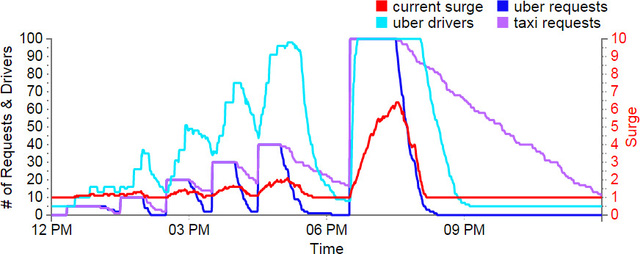Uber – the biggest explosion in the history of venture capital is about to plummet to 0?
- Tram Ho
On Medium, there is an article written by author Matt Ward discussing the possibility that Uber’s unicorn time will be gradually reduced to zero, and investors backing them understand it well. Here is the translation of this article.
Peter Thiel once said: ” Leading is only a tactic, not a goal. It is better to be the one who comes first .”
Listening to this, this seems to be a paradoxical idea. When is the latecomer better than the first?
Steve Jobs is probably the one who understands this best. Apple wasn’t the first MP3 company or the first smartphone. However, in the field of consumer technology, with both of these products Apple is now the leader.
It is not by chance fortunate. This is the theory that Peter Thiel said in practice. Wealth is not created by the advantage of being first, but by the monopoly advantage: A company conquers the market, making consumers forget about other products and continue to dominate. profitability.
Being the last survivor is when they can make a profit. That is the goal that any startup or business wants to achieve.
So that means business should be slow and tedious?
Is not. That’s not what Thiel said. Just look at Windows phones and Kodak digital cameras.
This is not perfectionism theory either. Lean start-up rules still apply. You want to go fast and be able to break something but don’t sacrifice the essentials.
The iPhone killed the Blackberry because it was 10 times better. The problem is not to become a rushed, impatient person in the market, but the problem is that Apple has built a great product to compete, combined with improving an increasingly powerful tool. time – is the App Store.
Streve Jobs succeeded while RIM failed thanks to his team. They convinced him that a third-party app store would be better than Apple’s programming team and they were right. Currently, despite fighting Android, Apple’s App Store is still a good place to keep users.
Competitive advantage
Apple’s leading advantage is not in the smartphone field, but in the third-party application store, success beyond imagination. Developers are racing to build applications and business models around the iPhone and the user experience for better, better. As more users, more developers join, there are more applications too – a spin never stops. As a result, money kept flowing into Apple’s bank account.
Apple is a good example of what all startups should do, and towards that is the steadily increasing over time of the business model.
The reason is because of competition pressure and the cost of attracting new customers. Enterprises with “weak defense” will always have difficulty on how to make a profit. Just look at Instacart and Uber. At a glance, these are great businesses but digging deeper, weak areas are starting to show up.
I would like to explain this:
Uber is a bit like “The house of cards”
There is no mention of their management team, Kalanick (co-founder of the company) or Benchmark (investment fund poured money very soon here). The story is much deeper than that.

This car-sharing app is a local business. And for such businesses, the local network must be very strong. Uber spends tons of money on getting into cities, hires drivers, and spreads money on promotions and ads to attract customers. As more drivers and more callers use the system, efficiency increases and the scale advantage begins to excel.
That’s why Uber, Didi, Grab and Lyft have raised so much money. It was a fertile land and venture capitalists poured money to race for control.
However there is a huge problem. Drivers and disloyal riders. The reason I use Uber or Lyft or any other application is because it’s cheap and advertised a lot. As long as there are better deals from competitors, I will leave.
This is very true for the driving wing. Most Uber and Lyft drivers use two phones and drive for both. Which company pays them more then they do!
These things show that the “economic moat” – Economic Moat (a company’s distinct advantage compared to its competitors), is difficult to copy or copy, helping the company maintain its market share and protect its interests. Uber’s profit) is not very stable, is it? Actually much worse.
“Taking money to buy you”
Every Uber city that infiltrates them has to spend a lot of money. Any other ride-hailing app, however, must do so. But how did Uber win? Upon entering a city earlier, they spend more aggressively than their competitors to “bribe” drivers and customers.
However, anyone can do so. China challenged Uber and they won, forcing Uber to leave.
We will also see more such situations. Startups are emerging in cities and countries around the world to compete with Uber. They raise money and even go down even harder than Uber.
That is the big problem. It shows that, in the international arena, Uber has almost no door. They will always be in a passive position. That means Uber cannot be the last remaining car-hailing company in the market. Without monopoly, they can’t create price power.
Once again, it shows that Uber’s “economic moat” is too weak!
Airbnb is similar to Uber but in the more advanced version
While Uber is like a company in tragedy, having to burn money to compete, Airbnb is on the right track.
Airbnb’s “economic well-being” shows that unless decentralization eliminates the existence of the Internet today, Airbnb will be a huge profitable business. How often do you travel? About 2 times a year. Or dozens of times if you’re a moving person.
So what is the difference between Uber and Airbnb?
The answer lies in the impact of the network. While Uber riders always use apps in their area, Airbnb is about exploring. Their network is global and therefore almost impossible to replicate.
Imagine this. BnbAir – an Airbnb competitor decided to raise capital and push into the states of SF, Austin or NYC. When will you use their service? Only if you were in that city? The problem is that you don’t just travel to one, two or three cities … You don’t want to have to use different applications for each city you visit. Imagine how troublesome it is. Customer experience will be extremely bad.
That means that the only way for BnbAir to gain customers is to advertise on Facebook targeting those who travel there. And they will need to spend huge amounts of money, of course!
The price power
Because Airbnb owns an international network, they have an exclusive element. Sure, Couchsurfing and some other platforms still exist but the main segment of Airbnb is almost inviolable. That means they can raise prices, increase profits, and users have no choice but to stick to it.
In the worst case, a competitor tries to raise $ 10 billion, $ 20 billion, $ 100 billion to “dry blood” with Airbnb, the company can still lower prices, reduce profits and maintain business activities.
Finally, like Uber, Airbnb’s competitors will run out of money and … The game is over!
The best evidence for what I said above is the Benchmark fund.
Benchmark Capital is one of the pioneering venture capital fund companies on Uber. So why are they suing Uber lover / Travis Kalanick?
Benchmark has invested $ 12 million in Uber from its early days in exchange for a 20% stake. Uber is currently worth $ 7 billion. That means the amount of Benchmark is currently only worth 1.397 billion USD.
It is money to change the game. That means the Benchmark accepts to throw away its reputation in exchange for a rain of money, at least with Benchmark.
However, that also has another implication. Benchmark itself is well aware of that. While there are significant competitive advantages over its competitors, I bet Benchmark is worried about losing their investment.
Uber’s wallet is starting to run out. On August 23, 2017, the amount of money burned by Uber was nearly $ 2 billion per year. Uber is like a giant fire at first, but then the material burns out. Without further investment, Uber will soon collapse completely.
Imagine a plane running against the runway, trying to break through the airport’s protective barrier and change direction to take off. If Uber changes direction, hundreds of billions of dollars can be “safely landed”.
Unfortunately, in the world of capitalism, there is no room for such a “safe landing”.
On Benchmark’s side, they seem to have seen a bright light of hope – selling off shares or IPOs to withdraw money. They cannot let $ 1.4 billion melt into smoke.
Can self-driving cars save Uber?
Is not. Uber’s business model is based on the core that the driver owns his car. In the world of self-driving cars – who owns the car? Or they will be the common property of Uber.
So what happens to Uber’s self-driving cars? Oh, Uber can buy in bulk or rent them out.
Of course the accompanying costs are not small. Don’t forget car insurance premiums, be it self-driving car insurance or fleet maintenance.
And while self-driving cars increase investment efficiency and reduce empty time, what happens at night? Uber’s demand chart shows the gap in this plan. What percentage of the time the car is not in use? Obviously not 0%!

That means the cost of capital will be terrible. Suddenly, Uber’s self-driving cars are not attractive or have the potential to be profitable. What happened to the world’s largest taxi company but didn’t own any cars.
One more problem: Competition. Google has a better advantage in engaging in self-driving cars. And there’s a group of startups and corporations waiting in line to join. Then Tesla, not to mention Elon Musk.
The question is whether Uber can overcome all these competitors or not? Is there a scenario where Uber can finally win?
Ability.
Breakthrough Thinking
I mentioned in a recent article on the possibility that Google can become a powerful force in the field of self-driving cars. Can a Chrome-like platform be applied to vehicle control, thereby attracting customers and creating surplus value?
What if Uber owned a company like Netflix or Hulu? They can sell entertainment content on their own trips.
Uber needs a push to increase sales. Uber needs a way to increase profit margins without spending more money. And most importantly, they need to retain customers and drivers.
A few Uber drivers did this and made more money from advertising and affiliate marketing. Uber can do the same for drivers and eventually self-driving cars, adding value to both drivers and riders. Extra income will help Uber reduce the commission to keep drivers and customers on the platform.
These are still theoretical. There will still be logical flaws, but one thing is for certain: Uber needs to think broader, be more innovative, or the company will be in big trouble.
The last words
What do you think? Is Uber struggling? Do you prefer Uber or Airbnb? Can anyone save Uber from themselves and their business model?
These questions have not been carefully considered in the technology world. Uber is clearly still the biggest hit in venture capital history (at least before the IPO).
The bigger it is, the harder it is to fail and the bigger the ambition. I do not bet Uber will go down, while Airbnb will rise.
According to Medium
Source : Genk
